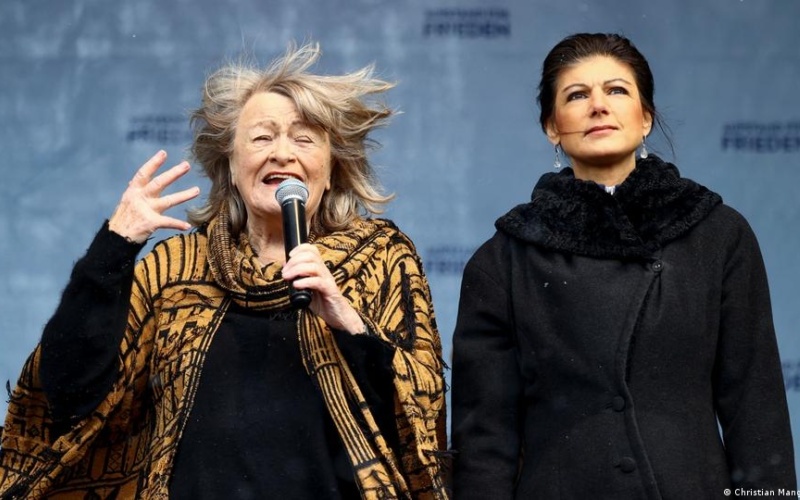German MP Sahra Wagenknecht, of the left-wing Die Linke party, at a Berlin event calling for an end to support of Ukraine’s defense against Russian invasion (Christian Mang/Reuters)
Since July, the Kremlin has been pursuing the development of a bloc of German activists — linking the far right and the left — to oppose support for Ukraine against Russia’s invasion.
Documents from a “European intelligence service” detail the operation, first proposed by Kremlin Deputy Chief of Staff Sergey Kiriyenko to political strategists on July 13 as the “focus” of efforts to undermine European support for Ukraine.
At least one person close to Sahra Wagenknecht, of the left-wing Die Linke party, and several members of the far-right Alternative für Deutschland were in contact with Russian officials as the plans were drawn up.
Russian officials set the goal of winning “a majority in elections at any level”, boosting AfD beyond its 13% in polling. Kremlin political strategists wrote a proposed manifesto for the AfD that would make it the party of “Germany unity”. Sanctions on Russia would be declared as anathema to German interests.
The manifesto declares:
Inadequate politicians, unable to calculate the consequences of their decisions, have dragged Germany into conflict with Russia — a natural ally of our country and of our people.
Our interests demand the restoration of normal partnership relations with Russia….Today in Germany there are only two parties: the party of enemies of Germany and the party of its friends.
Russia’s German Contacts
It is unclear if the manifesto was ever delivered to AfD officials.
However, one official in the AfD and another close to Wagenknecht confirmed they were in contact with Kremlin officials or Kremlin allies. Three AfD lawmakers traveled to Russia on September 20 but broke off the trip within 24 hours following public criticism over their plans to visit the Russian-occupied Donbas area in eastern Ukraine.
Ralph Niemeyer, Wagenknecht’s ex-husband, confirmed to The Washington Post that he is still in near-daily communication with Wagenknecht. He said that, during recent meetings with top-level Kremlin officials in Moscow, it was clear that “there are certain people in Russia who have [an] interest” in a union between Wagenknecht and the far right.
“I know from private talks with these people that they are aware of the potential that this would have,” Niemeyer said. However, he added that Wagenknecht would never accept any support from Moscow.
Soon after the Kremlin issued it order for a union between Die Linke and the far right, AfD deputies began speaking in support of Wagenknecht in Parliament. Party members chanted her name at rallies. Björn Höcke, chairman of the AfD in Thüringen in eastern Germany, publicly invited her to join the party.
Meanwhile, Petr Bystron, an AfD member of parliament, traveled secretly to Belarus for three days in November. He only acknowledged the trip after it was revealed by Lithuanian and German media.
Bystron denied meeting any Russian officials, saying he only met with the Belarusian Foreign Minister about a “peace initiative”. However, just before the Russian invasion, he travelled to Kyiv to visit Viktor Medvedchuk, a close ally of Vladimir Putin who was the Kremlin’s choice to lead the Ukraine Government after Kyiv was overrun by the invasion.
The AfD made no comment in response to questions from The Washington Post. Wagenknecht, declaring there would not be “any cooperation or alliance” between her and the AfD, said any claim that she received communications from Russian officials or their representatives is “absurd”.
“[I have] “not been in contact with anyone from the Russian state or any of its representatives,” she said in a statement.
Kremlin spokesman Dmitry Peskov snapped, “This is 100% fake. We never interfered before and now we really don’t have time for this.”
But Niemeyer said that, during meetings in Moscow, he was given a special encrypted telephone for communicating securely with Peskov. He explained that the Kremlin official is interested in the effort to unite Wagenknecht and the AfD.
“Peskov doesn’t openly speak about that because he can’t be quoted as saying, ‘We wish this happens in Germany.’ That’s domestic policy,” Niemeyer said.
On February 25, just after the anniversary of the Russian invasion, Wagenknecht addressed 13,000 demonstrators at the Brandenburg Gate in Berlin. The gathering was calling for an end to military assistance of Ukraine’s defense.
Wagenknecht complained that German tanks, soon to be delivered to Ukraine, could once again be used to shoot at “Russian women and men”: “We don’t want Germany to be drawn deeper into this war.”
She never mentioned the invasion.

